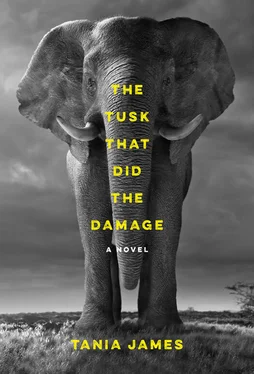The days went rainless. Teak leaves scrolled up and fell, hard as turtle shells, dragging themselves over dry earth.
At last a storm pounded through the drought, ransacking the trees of old leaves. Rain clattered against the roof of the pappan shed. A window shutter slammed the sill, waking Old Man, who pulled the shutters closed and slid the rusty hook into place. Romeo lay asleep on his belly, facedown, arms spread in a pose of drowning. As useful in sleep as he was at work.
Mani-Mathai usually slept on a pallet between their beds, but that night, the pallet lay empty. Another escape, no doubt, which would result in another beating. Old Man heaved himself up, sure it was too late, that the boy was just another shadow between the trees by now.
He found Mani-Mathai on the front step, arms around his big knees, staring into the dark. Old Man spoke the boy’s true name, Mathai, but the boy turned his face away. Were those tears on his cheeks, or rain?
Come inside, Old Man said loudly, to be heard over the weather.
Coming, said the boy, without moving.
Old Man imagined himself in bed, sliding down a swift tunnel toward the few hours of sleep that remained. Instead he settled onto the step beside Mani-Mathai and watched the rain thin to needles.
I do hear them, said the boy. I feel the elephants talking.
I believe you, said Old Man.
The boy sucked his teeth. Old people don’t believe in anything. They think they know everything.
Who said I am old?
The boy glanced at Old Man and wiped a thick finger under his nose. You look old.
Old Man didn’t know how to respond. What would comfort the boy? A hand on the shoulder? A hand on the head? Old Man was still debating shoulder versus head when Mani-Mathai said, Could I have a day off?
Yes. One.
My father says I only get a day off when you do.
I get a day off when the elephant does.
The boy sighed into the night, his face a study. Was he born in chains?
He was taken as a calf. His mother was shot by poachers. When the forest guards found him, he was by her side.
Do you think he remembers her?
He remembers everything. That is the elephant’s great gift.
After a pause in which it seemed the boy’s mind had drifted elsewhere, Mani-Mathai said, Terrible gift.
Old Man was taken with the simple truth of those words, laid side by side. For someone so young, so simple, the boy had depths.
The elephant takes to you, said Old Man.
I feel that too.
Old Man let pass a few moments of silence, then said: Did I ever tell you about the time the elephant saved my life?
The boy looked over, wary, and shook his head.
Once we were at a temple, and people were coming up closer and closer to touch his tusk and feed him bananas and get a blessing. I could see he was nervous, the way he stuck his trunk tip in his mouth. I tried to push the people back. I spread my arms, but they pressed in, shouting at me to get out of the way. Next thing I know I am rising through the air. The elephant had plucked me up by the waist and planted me on his back.
What did the people say?
Nothing at all! Like a school of gaping smelt down below. Like a god in flesh had landed among them and me on his back with my rump in the air.
Mani-Mathai gazed off in the direction of the elephant stalls, where eight beasts slept on their sides, eight awesome pumping hearts the size of jackfruits. Do you believe he is a god? the boy asked.
Old Man stopped short of the truth, that there were times when he feared the elephant more than he feared anyone’s god. That he sensed something cloudy behind those honey-clear eyes. That, as he was being whisked through the air, coiled up in the trunk, Old Man had thought his moment had come, that the elephant had turned on him: every pappan’s deepest fear. What he also felt in that airborne second was the prickling sensation of epiphany: So this is what he felt for me all along.
Come, said Old Man. Still a few hours of sleep left.
Not yet. Mani-Mathai looked at him pleadingly. Tell another story. A long one.
Old Man remembered a similar hunger for stories, his father’s low voice wrapping around him like a shawl, restoring magic to the drudgery of their days. Even if no one valued the insights of a pappan anymore, the stories told of a time when they had. To pass these stories along was to hope for better. And Old Man had no son, only this boy with hope-starved eyes.
So Old Man told the story his father had told him so many times, with so many different endings, it seemed to knit itself anew each time he spoke it aloud.
§
Long ago, in the time before tusks, every bull elephant had wings. Taloned, scaly, latticed with veins, they carried the males through the air while the cow elephants watched from below, with casual interest. Such feats they performed in mating times, such aerials and dives!
Until the Sage ruined everything.
The Sage resided in the dark heart of the woods, a puckered pious grump who kept mostly to his own. One day while the Sage was praying, a flying calf dropped a foul load on his head. Some said the calf was a prankster; others said he merely had bad aim (or excellent aim, depending on your opinion of the Sage). Set on having the last word, the Sage cursed all elephants to a flightless life.
In a matter of days, every elephant wing withered and shrank to a tissuey translucence and molted away. Elephants leaped and fell. Their thuds, their shrieks of anguish, silenced even the chattiest of birds for miles.
One of the elephants — we shall call him the Elephant — attempted to negotiate with the Sage. As usual, the Sage was in a temper, but he heard the Elephant out.
The tiger has its stripes, the Elephant complained. The peacock has its tail. The gaur is so ugly you can’t tell his rump from his face, but at least he has horns.
What do you want from me? said the Sage.
The wings, O Holy Sage. The wings were our best thing.
Don’t O Holy me. Even if I wanted to reverse the curse, which I do not, I cannot. What’s cursed is cursed.
Can’t you give us something else then? Something beautiful and mighty of our own?
After much flattery and blather, the Sage relented. He poured a fistful of dirt into a cloth pouch. Rub a pinch onto your upper teeth, he said, and see.
The Elephant did as he was told, and by next morning, two of his teeth had grown into swooping, sparkling tusks of ivory. At first, he was unimpressed. They were beautiful but useless, unlike the broad armor of wings. But that very day, the other forest animals herded around the elephant and marveled at his new equipment. The monkeys hung from them, and the birds perched near the tips. From the depths of the forest, the tigers mewled with envy.
The cow elephants found the tusks quite handsome. The other bulls, noticing this, powdered their own teeth with the Sage’s dust, and soon almost every forest bull had tusks of his own — with mixed results. Some yellowy and splayed, some slender and sharp, some blunt, some long, and one poor deformed bastard who starved to death because his tusks crisscrossed directly over his mouth. Everyone agreed that the most imperious of tusks belonged to the Elephant.
Rumor of the tusks reached the Rajah, who invited the Elephant to the palace in order to see these twin miracles for himself. In preparation, the palace floors were polished to a high sheen, the front steps demolished and rebuilt wide enough to fit an elephant’s foot. Up the steps the Elephant went, the crowds of commoners cheering down below. Inside the palace, the nobles went up in flaming fits of admiration. One lady fainted; the others stepped over her to marvel at the Elephant. Even the Rajah teared up at the sight. Such a mighty creature, and those tusks, those amazing, impossible tusks!
Читать дальше












